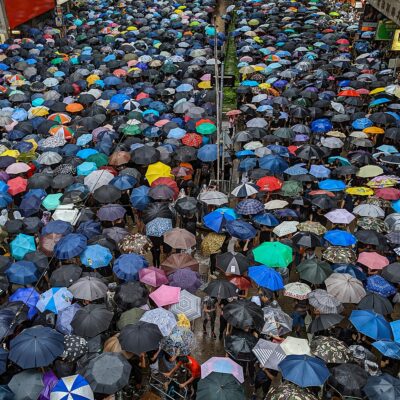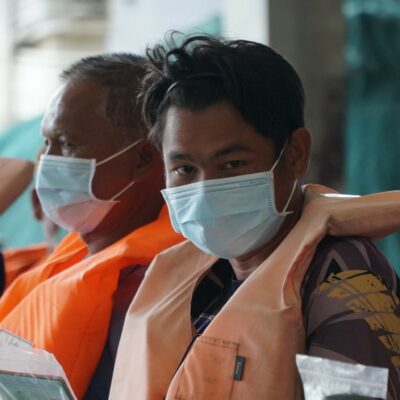Multilateralism is in recession. Over the past five years the beneficiaries of globalisation have been driving nationalist agendas on populist platforms in an increasingly multi-polar world, demanding freedom from the obligations that brought about their success.
COVID-19 has forced the frailty of multilateralism to the fore while affirming the imperative of interconnectedness: the World Health Organization (WHO) has become the most recent casualty of blame-game politics between Beijing and Washington, while more than 100 countries clamour to the International Monetary Fund seeking urgent bailouts from the resulting calamity.
Designed by last century’s major powers, post-World War II international institutions require reform reflective of today’s political reality and responsive to the crises of this century. Leaders of multilateral institutions have called for a ‘new multilateralism’ aimed at ‘improving the lives of all this world’s citizens’, however progress has been slow. COVID-19 has done what climate change, cybercrime and corruption could not – posed an immediate threat to human life, forcing immediate action for the common good.
India has emerged onto the international stage as an active if unexpected leader amid the COVID-19 chaos. Though international sentiment had cooled toward India at the beginning of the year due to divisive domestic politics, Prime Minister Modi has since positioned India as a humanitarian leader in this pandemic, shipping tonnes of medical supplies to nations in need and winning support for his early coordinating action across bilateral, regional, plurilateral and multilateral fronts. Modi has reached out to a number of leaders to coordinate cooperation against the pandemic, called for a strengthening of the WHO’s powers and urged G20 leaders to support a new ‘human centric’ view of globalisation instead of an economic centric one.
Multilateralism in recession
The recent waves of Western nationalism have caused the effectiveness of multilateralism to recede. The Brexit referendum in 2016 showed what discontent with globalisation could unravel. Donald Trump’s election as President of the United States in 2017 set in motion a dismantling agenda. He swung into action like a wrecking ball, stymying the legal effectiveness of the World Trade Organization through prevention of appointments to the Appellate Body and withdrawing from UNESCO. He halted payments to the World Health Organization (WHO) in the middle of the 21st Century’s largest global health crisis. And most tellingly, Trump last year declared to the UN General Assembly that ‘the future does not belong to globalists’. His unapologetic nationalism has licensed other countries to question their commitments and query being bound by ‘negative globalism’.
Part of the backlash to multilateralism stems from increased disparity within nations, where the losers of capitalist efficiency are instructed to blame globalisation for the offshoring of opportunity. This has given rise to a re-emergence of nationalism with increasing ‘[insert country name] First’ movements which generally fail to address socio-economic failures such as wealth distribution at the domestic level, making instead globalisation the scapegoat of inequality.
International organisations have been responsive to these winds of change. In 2018, then Managing Director of the International Monetary Fund Christine Lagarde called for a ‘new multilateralism’ that ensures the economic benefits of globalisation are more evenly shared. WTO Director General Roberto Azavedo conceded the WTO requires reform to respond to 21st century challenges. In 2019, Espinoza Garcés, President of the 73rd United Nations General Assembly (UNGA), made the central theme of the meeting: Making the United Nations relevant to all people. In the margins of the UNGA, the French and German governments launched an ‘Alliance for Multilateralism’ to promote respect for international law and stability through cooperation – attracting the participation of 50 foreign ministers. These efforts have been made in sincerity, but not in urgency.
While some have lamented a global crisis striking when multilateralism is at its weakest, it has in fact created the perfect storm for change. This is not the first time the global order has been tested. The League of Nations, established after World War I to guarantee global peace, fell apart in the tense years preceding World War II. This did not signal the end of multilateralism but the need for a new architecture, and the United Nations and Bretton Woods Institutions followed by the WTO were created by the superpowers of the day – with the United States the paramount force.
As the world navigates the worst health and economic crisis of the century, it remains to be seen whether ‘superpower status’ continues to be relevant to the shaping of a new multilateralism and which leaders will rise to shape it, either as emerging super powers or as a coalition of influential leaders.
India has emerged as a leader of ‘New Multilateralism’ amid COVID-19
Since COVID-19 broke as a global pandemic, Prime Minister Narendra Modi has been on a leadership offensive. He organised a teleconference with the South Asian Association of Regional Cooperation (SAARC) countries in mid-March and declared a regional emergency fund, to which India committed USD10-million. He reached out to Saudi Arabia, this year’s G20 host, to urge a virtual G20 Summit to coordinate the economic fallout of COVID-19 containment measures, which was also held in March. At the meeting, Modi articulated the importance of ‘new multilateralism’ principles and a more humane approach to globalisation. He also staunchly supported the WHO, calling for other G20 leaders to strengthen its powers in the wake of Trump’s halting of US funding. Most recently, Modi addressed the Virtual Non-Alignment Movement (NAM) Summit of more than 120 countries to discuss global management of COVID-19. Speaking at NAM, Modi called for solidarity: “In the post-COVID world, we need a new template of globalisation, based on fairness, equality, and humanity.”
Modi has also conducted a slew of bilateral calls, including with the leaders of Australia, Russia, Israel, Japan, Canada, France, Germany, Indonesia, Singapore, UK, Ethiopia and the United States. Though most calls were about pledging assistance and coordinating consular support and medical research efforts, the calls with French President Emmanuel Macron and German Chancellor Angela Merkel also included commitments to ‘a new human-centric concept of globalisation’.
The US, having drawn a hard line against soft power, created an opening for the international leadership role it decisively vacated. Conjecture initially had China filling this void: China was initially commended by the WHO for its effective domestic measures and proactively shared its national experience to help other countries, while Chinese entrepreneur Jack Ma funded global vaccine efforts and exports of personal protective equipment (PPE). Meanwhile, at the beginning of the year Modi was being criticised for his government’s controversial Citizenship Amendment Act (CAA) and other legislation thought to be aimed at creating anti-Muslim sentiment, with members of the European Parliament drafting a resolution against the CAA, fearing it could cause the ‘largest statelessness crisis in the world’.
In this context, Modi’s cooperation with France and Germany and a rise to global responsibility may seem unexpected. However, in a matter of months, Beijing is now on the back foot as it excludes the WHO from investigation efforts into the virus’ origin. Washington’s constant criticism of China and calls for compensation is unconstructive and detracts from cooperative efforts. The global crisis has shifted focus from India’s domestic human rights challenges as India engages in ‘saviour diplomacy’, exporting PPE and – reportedly – the hydroxychloroquine drug and other needed medicines and food. Prime Minister Modi’s efforts at global coordination at a time when others are abandoning multilateralism have been well received by defenders of the international order. India’s reputation as the largest democracy in the world and as a longstanding defender of development also holds it in good stead for inclusive leadership.
India is uniquely qualified to play an international leadership role in a new global order
There are few countries with whom India does not have good relations. India’s broad-based friendships stem from its non-aligned philosophy. Arriving on the international stage in the aftermath of WWII with unapologetic autonomy, India refused to trade in its hard-fought freedom from Britain for a false dichotomy of communism versus capitalism. As a newly independent state with a poor population of 350 million, a partitioned territory and a global share of GDP of just 3%, India nevertheless became a leader on its own terms. Leading the Non-Alignment movement of emancipation for emerging states in support of Third World solidarity, India has remained a steadfastly autonomous political power.
As a result of its strategically autonomous foreign policy, India has maintained a wide array of relationships including Saudi Arabia, Israel and Iran, the United States, the UK, EU and Russia while continuing its third world solidarity role as leader of the ‘Group of 77’ of least-developed and developing economies. India also has a workable relationship with China, its number one trading partner, as evidenced by its founding member status of China’s Asia Infrastructure Investment Bank (AIIB) and Prime Minister Modi’s famous ‘power selfie’ with then Premier Li in 2015.
Strategic autonomy remains a core principle of India’s foreign policy, as seen most recently by its rejection of the Regional Comprehensive Economic Partnership (RCEP) in 2019. Though the decision frustrated its ASEAN and Oceania trading partners, Indian officials have argued that ultimately India negotiates for the well-being of the ‘poorest 300 million’ not the top 300 million.
India’s influence stems from its geopolitical weight. In the World Trade Organization (WTO), for example, India throws its immense size behind the Third World network, winning a game of numbers as an influential voting group of 77 poorest nations. India has argued for a broader base of beneficiaries for the Global South, preventing the ceding of more economic ground to the Global North. India’s position has always been to assert Third World rights, leading ‘mini-ministerials’ to fight for the Doha Development Agenda. It is this commitment to a more inclusive, fairer global economic architecture that makes it a credible contender to shape the future of multilateralism.
India is not only exercising greater influence in existing institutions, it is emerging as an international institution creator. In the margins of the United Nations Climate Change Conference in Paris (COP21) in 2015, Prime Minister Modi co-founded the International Solar Alliance with President Macron. Unlike the creation of an economic institution, Modi’s focus was on ‘new multilateralism’ values: a renewable energy institution to promote a sustainable future, particularly to share green technology and green finance among the economically poorest but sun-richest nations between the Tropics of Capricorn and Cancer.
Last year, Modi launched the Coalition for Disaster Resilient Infrastructure (CDRI) at the UN Climate Action Summit in New York. CDRI is committed to ensuring all new infrastructure be disaster and climate resilient to ensure greater economic and social wellbeing for the most vulnerable populations, including small island states and developing countries.
India and the domestic frontier
Domestic response to COVID-19
Of course, to ensure international influence one must have capability at home. Domestically, Modi’s decision to lockdown 1.3 billion people with four hours’ notice attracted criticism for its impact on millions of migrant workers who suddenly found themselves without work or shelter. But World Bank country Director Junaid Ahmad described the national lockdown as “critical” in slowing the spread of COVID-19, and WHO South East Asia Regional Director Poonam Ketrapal Singh noted ‘it may be too soon to talk about numbers’, but welcomed India’s ‘tough and timely actions’ and its demonstration of “unwavering commitment in its fight against the pandemic”. It is clear that locking down a densely-populated nation of 1.3 billion would have challenges and consequences, but that prevention is paramount when public health systems are weak. Current publicly available figures have India managing just over 60,000 cases.
Economy
Though the question of whether India has yet emerged as a ‘superpower’ remains under examination, India’s international influence, including economically, is undeniable. India’s economy stands at USD two-trillion dollars – the fifth largest in the world; and is the fastest growing large economy. It plans to become the third largest economy in coming decades and has set itself a target of becoming a four trillion-dollar economy by its 75th anniversary of Independence in 2022.
Despite its size, the economy has been a sensitive spot for the Modi government. It has been in steady decline from a 7.7% growth rate in Modi’s 2014 election year. But Modi may politically benefit from a global COVID-19 economic crisis: the IMF’s April economic forecast predicted negative growth for major economies such as the US and Europe, but modest positive growth for India to a possible 1.9 per cent according to IMF Chief Economist Gita Gopinath.
India also stands to be a possible beneficiary of the loss of trust that China is facing, as foreign investors look to shift investments.
Indian Technology and the 21st Century
Finally, a fundamental measure of international influence is the positive or negative impact one can wield on the world. On the traditional military measure of superpower, India is a significant figure. Considered as a top five military power due to its sizeable active service of over a million personnel, India has also been investing in European, Israeli and American technology in addition to having a strong Russian base and indigenous military technologies. Combined with its status as a space power it is likely Indian rocket technologies and target precision would be globally competitive.
More broadly, India prides itself on innovation. In health, India is renowned as the world’s largest generic pharmaceutical producer and is making advancements in medtech, digital health and pharma development. Producing 70% of the world’s supply of the currently coveted hydroxychloroquine and a significant supplier of PPE, COVID-19 has made India one of the most relevant and influential responders to the crisis. Whereas military might was a key measure of superpower status in the 20th century, ‘saviour diplomacy’ requires capability in existential threats to humankind, which is increasingly from health and environmental threats. India’s investment in medical and renewable energy innovation and its global leadership in these spaces will continue to cement its relevance in this century.
India is also a space power, a nuclear power and an Information and Communications Technology power with aspirations in green energy to become a solar power. India understands the value of technology and has created a cell of technology diplomacy within its Ministry of External Affairs. These sectors will continue to be relevant in the 21st century.
Conclusion
Multilateralism requires refreshing, not just because national commitment to modern day institutions is failing, but because these institutions are not equipped to address the existential challenges of the day.
In part, India’s emerging international leadership role is due to the vacuum left by the United States in global leadership. Donald Trump has played a large role in vacating an international space and Prime Minister Modi has found a willingness in France and Germany in particular to partner to support a new multilateralism.
The COVID-19 crisis has allowed India to assert its strengths in pharmaceutical and PPE manufacture, national coordination and broad-based influential relationships at a time when superpowers like the US have publicly failed the world and their own people. As the largest democracy in the world, India can also step in where China has lost much trust in its lack of transparency in managing COVID-19.
For India to maintain its position as a leader in a post-COVID world, it will need to maintain relatively low rates of infection, save lives at home, and steer clear of negative growth. India will also need to demonstrate that its international commitments to inclusiveness and humanity are applied in its domestic settings, stemming communal conflict domestically.
India will be the host of the G20 in 2022, the year in which India celebrates 75 years of Independence. This will allow India to set a globally significant agenda for a new multilateralism as the world begins to emerge from deep crisis.
It has proven it is a credible contender to shape that vision.
Image: Indian government buildings, New Delhi. Credit: Ninara/Flickr




